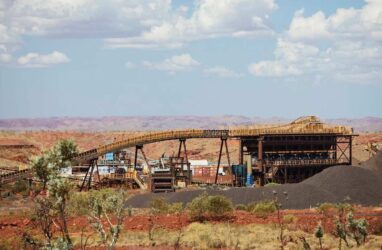Feed aggregator
‘Positive narrative’ on carbon pricing emerging in Australia, but risks and challenges remain, report says
Norway funds study to assess feasibility of direct air capture and storage plant
UK-France panel reveals extended biodiversity credits survey results
UN, Brazilian NGO announce German-funded $4.9-mln project to combat deforestation in Brazil
Switzerland violates women’s human rights by failing to tackle climate change, European court rules
Colombia forecasts Amazon deforestation to pick up, downsizes 2023 estimates
ARENA boosts funding and names winners for green hydrogen, iron and steel projects
The post ARENA boosts funding and names winners for green hydrogen, iron and steel projects appeared first on RenewEconomy.
Human rights violated by Switzerland inaction on climate, ECHR rules in landmark case
Court finds in favour of group of older Swiss women who claimed weak policies put them at greater risk of death from heatwaves
Weak government climate policies violate fundamental human rights, the European court of human rights has ruled.
In a landmark decision on one of three major climate cases, the first such rulings by an international court, the ECHR raised judicial pressure on governments to stop filling the atmosphere with gases that make extreme weather more violent.
Continue reading...EU lawmakers recommend withdrawal from Energy Charter Treaty
'Only the beginning': Greta Thunberg reacts to court ruling on Swiss climate inaction – video
Weak government climate policies violate fundamental human rights, the European court of human rights has ruled.
In a landmark decision on one of three major climate cases, the first such ruling by an international court, the ECHR raised judicial pressure on governments to stop filling the atmosphere with gases that make extreme weather more violent.
The court’s top bench ruled that Switzerland had violated the rights of a group of older Swiss women to family life
Continue reading...Euro Markets: Midday Update
Carbon project developer secures authorisation from Tanzania for first Article 6 credits
‘Political efforts’: the Republican states trying to ban lab-grown meat
Florida is on track to ban cell-cultivated meat while three others float it – but experts say the reasoning has little to do with safety, ethical or environmental questions
At a press conference in February, the Florida governor, Ron DeSantis, told a room full of reporters: “We’re not going to do that fake meat. That doesn’t work.” He’d been discussing legislation under debate in the statehouse that would ban cell-cultivated meat – an emerging technique that, instead of slaughtering animals for consumption, grows meat in a lab using a small sample of animal cells.
A few weeks later, a Republican member of the Florida legislature – and cattle rancher – Dean Black took to the House floor, saying, “Cultured meat is not meat … it is made by man, real meat is made by God Himself … If you really want to try the nitrogen-based protein paste, go to California.”
Continue reading...Methane from landfills is detectable from space – and driving the climate crisis | Gina McCarthy
Landfill trash is the third-largest source of human-caused methane pollution in the US. To fight global heating, curb waste
An elusive climate menace is now easier than ever to see. In early March, a rocket launched into the sky with a satellite that spots methane emissions from space. MethaneSAT joined more than a dozen similar satellites now in orbit, scanning the Earth for pollution and feeding that information back to scientists, policymakers, industry, and the public.
What story does the data tell? One of methane on the rise, or one of collective efforts that avoid the worst impacts of the climate crisis? Slashing methane is the most efficient way to slow global warming in our lifetimes. We have the chance – and the obligation – to do so.
Continue reading...EU industrial heavyweights outline green priorities for next European Commission
First ever climate change victory in Europe court
FEATURE: EU set to clamp down on methane, but some worry coal emissions will slip through
Lula is styling himself as the new leader of the global south – and shifting attention away from the west | Jordana Timerman
Through the G20, Brazil’s president is challenging the dominance of the richest countries. This year will be a huge test of his strategy
The world stage often seems sepia-toned, dominated by the dusty international structures of the post-second world war era, favouring the world’s richest countries. However, it is increasingly clear that this setup isn’t sufficient to respond to the interests of the global south, including combating climate breakdown and expanding economic development.
Recognising this mismatch, Brazil under President Luiz Inácio Lula da Silva has positioned itself as an international leader, focused on the agenda of emerging economic powers who prize stability, and in fact have much to lose from conflict and power struggles between rich countries.
Continue reading...



